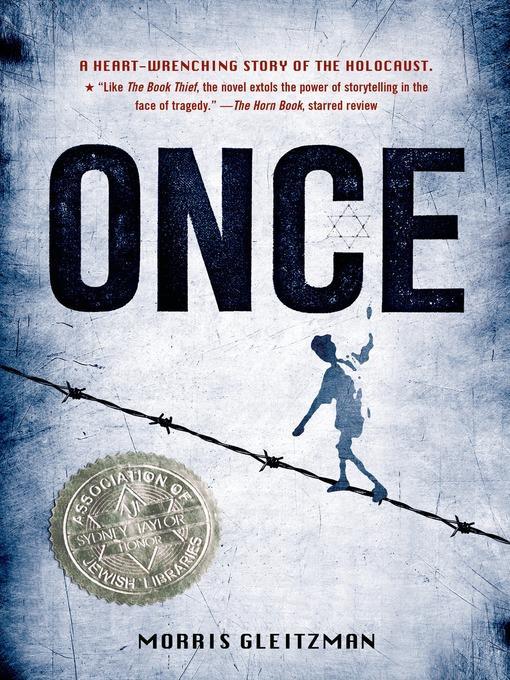
Once
Felix and Zelda Series, Book 1
فرمت کتاب
ebook
تاریخ انتشار
2010
Lexile Score
640
Reading Level
2-3
ATOS
4.1
Interest Level
6-12(MG+)
نویسنده
Morris Gleitzmanشابک
9781429922340
کتاب های مرتبط
- اطلاعات
- نقد و بررسی
- دیدگاه کاربران
نقد و بررسی

56reading - This is one of the greatest books that I have read for various classes. Most of the students that I read it to are about Years 5 and 6. They love it because of the mystery, the drama and comic relief. It's a comedy and a tragedy at the same. I recommend this book for all Year 5 and 6 students!

Starred review from March 8, 2010
Tension builds swiftly in this wrenching tale as Felix, a preteen Polish Jew, narrates his experience of Holocaust atrocities, framed by a search for his parents that begins when he escapes from a Catholic orphanage. A natural storyteller, Felix begins each chapter with a formulaic prelude: “Once I was living in a cellar in a Nazi city with seven other children,” before chronicling events in which his narrative gifts provide comfort and courage to himself and others in increasingly bleak circumstances. After finding his home occupied by hostile neighbors, Felix witnesses pointless murders on a forced march. Gleitzman (Toad Rage
) allows readers to draw conclusions before Felix does (he thinks a book burning is being conducted by “professional librarians in professional librarian armbands”), making poignant Felix's gradual loss of innocence when he realizes that Hitler is not a protector but “the boss of the Nazis,” and when he finally accepts his parents' deaths. The humorous dimension of Felix's narration provides welcome relief, while courageous acts of kindness by Catholic nuns, a German neighbor, and a Jewish dentist lend this tragedy universality. Ages 12–up.

April 1, 2010
Gr 6-9-Felix lives in Poland in 1942, and reading is his survival mechanism. Now almost 10, he was sent to a Catholic orphanage three years and eight months earlier by his Jewish bookstore-owning parents, and he's convinced himself that the sole reason he remains in hiding is because Nazis hate books. He's a natural storyteller, and when he finds a full carrot in what is typically a woefully thin bowl of soup, he fantasizes that it's a sign from his parents that they're finally on their way to take him home. When the orphanage is visited by surly Nazis instead of joyous parents, Felix escapes with only his cherished notebook full of his stories into the nearby countryside, still hoping for a family reunion. He soon discovers a burning home with two slain adults in the yard and their young daughter bruised but still alive. He takes Zelda on his journey, shielding her from the reality of her parents' deaths in much the same way he's been comforting himself, by inventing alternative realities. But, as he encounters the escalating ugliness of the death marches that are emptying his old neighborhood, now a ghetto, Felix becomes increasingly conflicted about the need to imagine a hopeful order and the need to confront brutal reality head-on. An easy first-person narrative in terms of reading leveland a good choice as a read-aloudthis Holocaust story also taps gut-punching power by contrasting the way in which children would like to imagine their world with the tragic way that life sometimes unfolds."Jeffrey Hastings, Highlander Way Middle School, Howell, MI"
Copyright 2010 School Library Journal, LLC Used with permission.

February 15, 2010
Grades 7-10 The horror of the Holocaust is told here through the eyes of a Polish Jewish child, Felix, who loses his innocence as he witnesses Nazi-led roundups, shootings, and deportations. After nearly four years in a kind Catholic orphanage, he runs away to find his parents. First he returns home, where he is chased away by new residents. Then he journeys to the city (that is, the ghetto), gets help from other fugitives, discovers the Nazis incomprehensible brutality, and is forced into a train bound for the camps. Through Felixs traumatized, present-tense viewpoint, readers learn of the genocide, in which books and bodies were burned en masse, as well as one victim at a time, including a baby who is shot dead in its high chair. Most moving is the lack of any idealization. Felix rescues a lost little girl, but rather than idolize him, she fights and fumes: Dont you know anything? Felix escapes, but one and a half million Jewish children did not, and this gripping novel will make readers want to find out more about them.(Reprinted with permission of Booklist, copyright 2010, American Library Association.)

























دیدگاه کاربران